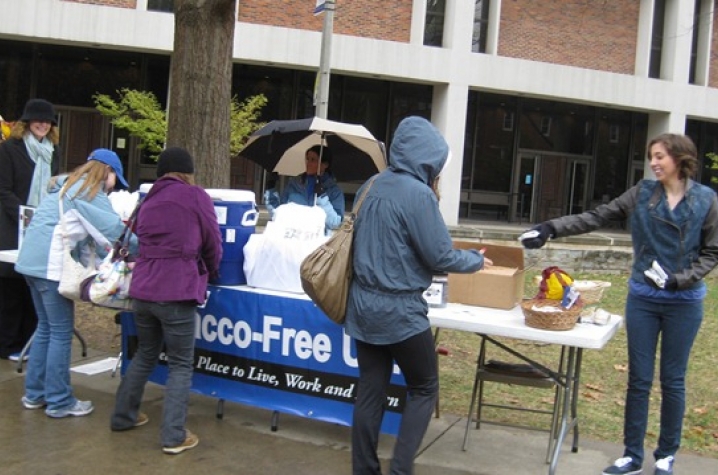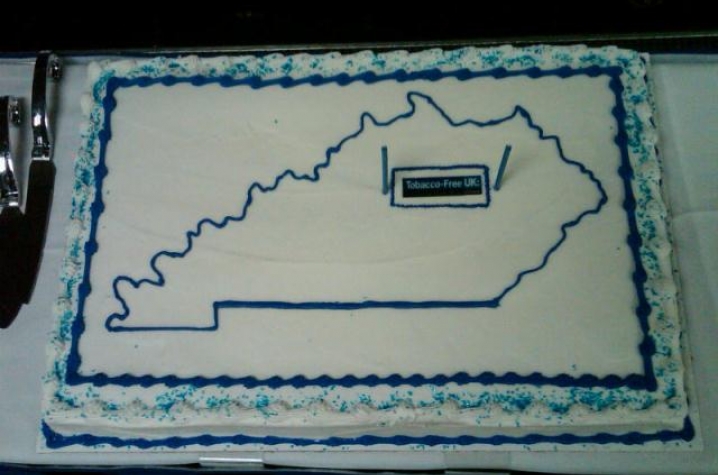UK's Tobacco-Free Campus Initiative a Role Model for the Nation
LEXINGTON, Ky. (Nov. 16, 2012) − The University of Kentucky campus, located in a state that is a national leader in tobacco production, joined a growing list of higher-education institutions with a tobacco-free campus policy in November 2009.
There have been a few challenges associated with adopting and implementing the policy, but overall the policy has been a success in the three years since it began. In addition, UK has become a leader and model for many universities across the nation as they begin to implement tobacco-free policies.
The road to a tobacco-free campus began in stages. First, the academic medical center campus went tobacco-free in November 2008, one year prior to the entire campus implementing its comprehensive tobacco-free policy. The nationally recognized Great American SmokeOut was designated as the implementation date for both the medical center and the campus-wide policy.
A Tobacco-free Task Force made up of representatives across campus was appointed 11 months prior to implementation. The Task Force, co-chaired by Ellen Hahn, director of the Kentucky Center for Smoke-free Policy and professor in the UK College of Nursing, and Anthany Beatty, assistant vice president for Campus Services, met on a consistent basis to develop and plan a strong policy based on a 3-T approach: tell, treat, and train.
In a study published by Hahn, Amanda Fallin, Audrey Darville, Sarah Kercmar, Melissa McCann, and Rachel Record in Spring 2012, consistent communication (tell), providing evidence-based tobacco treatment (treat), and having well-trained administrators, faculty, staff, and student leaders (train) to remind violators of the policy and report if necessary, were crucial to creating an environment in which compliance was expected.
In the Spring 2011, a team of designated ambassadors was formed, known as Tobacco-Free Take Action! (TFTA!). Ambassadors are trained in the proper way of approaching violators, including scripting techniques, how to respond if a violator refuses to comply with the policy, and how to properly document and report the violation. TFTA! ambassadors can be reached at: Tobaccofree@lsv.uky.edu
Hahn's study shows demand for tobacco treatment services increased, from an average of three enrolled in cessation programs per month before the campus-wide policy to 11 per month after the policy took effect, representing a 4-fold increase in quit attempts. During the period of the study, 975 free nicotine replacement coupons (a 2-week supply) were redeemed, a 4-fold increase in treatment use. Although the intent-to-treat estimated quit rate was only 8.7 percent, both students and employees reported high levels of confidence that they could remain tobacco free while on campus.
The success of UK's Tobacco-free Campus Initiative has been slow and steady gaining increased national visibility. Since 2010, UK has provided consultation to 25 higher education institutions in Alabama, Arizona, California, Florida, Georgia, Hawaii, Kentucky, Indiana, Illinois, Louisiana, Massachusetts, Michigan, Mississippi, Montana, Nevada, Ohio, Oregon, and South Carolina.
UK’s Tobacco-free Initiative continues to benefit more than 12,000 full-time employees, 28,000 students, 500,000+ patients, and visitors to campus, including three hospitals and ambulatory care. The policy has also benefitted other institutions of higher education as it is highly effective, adaptable, and replicable. Positive feedback and reports of success from other institutions that have applied UK's model and learned from our experiences has prompted policy change on college campuses across the nation.
Media Contact: Ann Blackford at (859)312-3587 or ann.blackford@uky.edu








